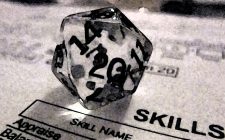Sometimes it can be fun to take a common trope and twist it. Keep enough of the core idea to guide some mechanical decisions, but take one part of the trope and go in a completely different direction. Just for fun, I put together a list of the classic D&Dish tropes as I see them, and a few ideas on ways to twist each of them.
Barbarian
The classic barbarian comes from a small, usually tribal society with low technology level. They’re dumb, violent, uncivilized, and
- Ecstatic Barbarians aren’t angry when they go into a rage. Instead, they gain their strength and invincibility because they’re riding the high. They may be drugged out of their minds or blissed out in a religious fervor, but their altered state is not an angry one.
- Prissy Barbarians loves fashion and hates dirt and gore, so they may charge into the fight if a foe splashes mud on their shoes.
- Urban barbarians are superstitious and violent, but at home in crowded settlements.
Bard
The classic bard is a charming musician who likes to pick up a wide variety of skills and knowledge and acts as the face of the party.
- Storyteller bards entertain and manipulate with enthusiastic gossip but are a bit tone deaf and not very musical.
- Theoretical Bards are genius at musical criticism or composition but have stage fright and hate performing.
- Stage Bards are great performers but are snobby or socially awkward and annoy people off stage.
Cleric
The classic cleric is a devout priest who heals the injured and channels the power of their god. They especially fight the undead.
- Placating clerics don’t love their god but just appease the deity, trying to protect people from their scary deity’s unwanted attentions.
- Emulating clerics behave like their non-upstanding gods. For example clerics of trickster gods may worship through with pranks and deception. Clerics of hedonism gods may be served with acts of overeating and laziness.
- Pragmatic clerics don’t really follow a calling as much as take on a job to take on to make ends meet or please their family.
Druid
The classic druid harnesses the power of nature, shapeshifting and commanding animals, plants, and the weather. They are devoted to protecting nature and maintain a neutral stance in terms of morality but oppose civilization and technology.
- Farmer druids practice agriculture in prosperous, sustainable communities rather than in the wilderness.
- Research druids work as biological scholars at a prestigious university, understanding complex ecological systems or breeding new aberrations.
- Entertainer druids may work in a traveling circus, putting on performances as both the animal trainers and the animal performers.
Fighter
The classic fighter is skilled in weapons, armor, and fighting styles, but unskilled in areas outside of battle.
- Gadget-geek fighters obsess over obscure weapon details and innovations but constantly waste time and money on flashy, impractical battle gadgets.
- Pacifist fighters battle towards submissions but keep a vegetarian lifestyle and are unwilling to kill anyone.
- Nervous fighters find comfort in the familiar context of battle but have a social anxiety or suffers from phobias.
Illusionist
The classic illusionist is a deceptive, manipulative magic user with showy, glamorous magic.
- Boring illusionists work as a spies, using illusions and mental effects to appear ordinary, boring, and forgettable.
- Philosophical illusionists create illusions as abstract artistic statements on the nature of reality. They ponder how everything is already an illusion and may reference Plato’s cave a lot.
- Fighting illusionists subtly confuse the senses of their opponents, forcing their foes to block attacks that don’t exist. They’re martial artists first and foremost, with illusion as simply a well-loved tool in their tool set.
Monk
The classic monk is a contemplative martial artist who hones their body and chi as weapons.
- Gladiator monks are involved with politics, have a fan base, and make their living as gladiators. They eschew isolated monasteries for high-stakes competition and a lavish celebrity lifestyle.
- Ascetic monks live a religious, monastic lifestyle. They’re devoted to their gods, practicing harsh discipline to better focus on spirituality rather than achieve martial mastery.
- Fitness craze monks are physical specimens who buy into every superstition, quack remedy, and pseudo-scientific explanation that anyone tells them about their nutrition, exercise, or chi.
Paladin
The classic paladin is a zealous defender of law and good, a knight in shining armor devoted to a cause.
- Libertarian paladins encourage people to strengthen themselves. They may provide them with lessens and weapons to defend off a coming evil as long as they pay a fee, but they will move on before it arrives so as to not stifle individualism and accomplishments.
- Conspiracy paladins seek to smite in all the wrong places. They zealously search out the sources of chaos and evil, but have very unorthodox ideas on what those might be.
- Grifter paladins takes down the prideful, greedy criminals because they make the easiest, plumpest marks.
Ranger
The classic ranger is a self-sufficient fighter, hunter, and survivalist. At home in the wild, they have a wide variety of skills, especially physical and nature abilities. They may also have a beast companion.
- Research rangers study wildlife, carefully hunting down rare beasts. They tag them, record their behavior, and return them to their natural habitat.
- Competitive rangers master multi-day forested obstacle courses, run cross country across really wild country, and participate in special events against other wilderness athletes. For them, typical adventuring is merely cross training.
- Artist rangers chase after the beauty of nature. They can predict the light quality at a specific time and place and have memorized grand vistas. They use their dual wielding to keep carving wood sculptures or painting plein air while fending off wolf packs.
Rogue
The classic rogue is a dexterous character who specializes in skill use and often has underworld connections. In combat, they specialize in backstabbing.
- White hat rogues advise on security. They are highly sought after, breaking into establishments at the direction of the owners in order to asses their weaknesses.
- Aristocratic rogues take advantage of their delicious reputation and knowledge of higher society to perfectly plan their heists. Because the aristocrats all liars and thieves, anyway.
- Wilderness rogues specialize in natural traps and hazards, sneaking around nature areas, and charming animals and fey.
Sorcerer
The classic sorcerer inherits magic power because of a strain of magic in their bloodline. They don’t need to study to master it, but they do tend to have a built-in specialty related to the strain of magic.
- Humanblood sorcerers inherit the powers of powerful, ancient humans. They’re not only wealthy and influential, their ancestors imbued their blood with the power they used to conquer empires. Up with Humanity!
- Adopted sorcerer. Their powers aren’t inherited through their genetics, but instead bequeath to them from adoptive parents (dragon or otherwise) or other beloved relatives who put them in a magic will.
- Mutant sorcerer. Their blood is powerful, but it has nothing to do with their ancestors and everything to do with a freak accident, possibly involving being infected with magical biohazard waste or bitten by a magical insect.
Warlock
The classic warlock is an dark magic user who gets eldritch abilities by making a pact with a dark power.
- Family warlocks make pacts with ancestral spirits, gaining a gossipy, meddling set grandmother and grandfather ghosts nagging them to eat more and ignore the flirt who was just winking at their cousin last week.
- Childhood warlocks make pacts with their monster-under-the-bed and to get powers of Shadow and Fear in return for perfectly cooked chocolate chip cookies and story time.
- Legal warlocks approach their contracts with the ruthlessly careful approach of a professional lawyer, not the angsty melodrama of an emo teen. Their patrons fear them, or at least the gauging they can expect with every contract review.
Wizard
The classic wizard is a scholarly (nerdy) magic user with few non-cerebral skills.
- Jock wizards keep the body sharp in order to keep the mind sharper. They mix the discipline of a monk with an interest in arcane studies.
- Charming wizards smooth talker their way through life, using spells to cast special effects when telling stories and conjuring trinkets or delicacies for the locals.
- Practical wizards hold down-to-earth, unglamorous jobs such as an arcane sanitation specialist cleaning up magical biohazards or as a corporate lawyer, negotiating and auditing mystic contracts.




I would love to read the next article. Keep it up!